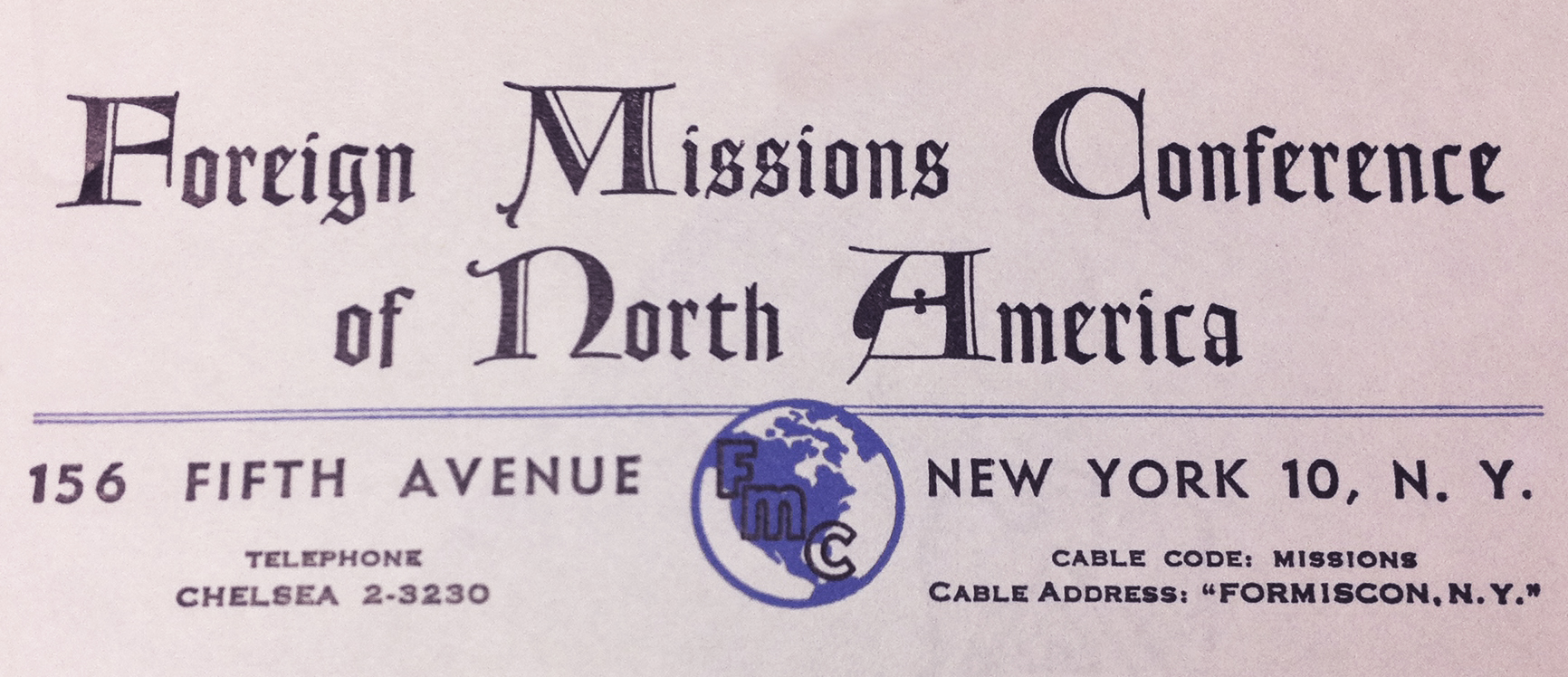
Credit to: WAB: Foreign Missions Conference of North America Records, The Burke Library Archives (Columbia University Libraries) at Union Theological Seminary, New York.
I had the pleasure of working on the World Council of Churches (WCC) and the Foreign Missions Conference of North America (FMCNA) collections this summer and the following highlights the materials that I found to be most interesting and the ways in which these materials enhance my research. The WCC is an organization dedicated to ecumenical dialogue within the Christian tradition (and beyond), and the FMCNA organization is a missionary relief effort that, through various committees, sought to assist the underserved or populations in crisis.
While working on the WCC records, I found an extensive collection of scholarly papers and had the pleasure of looking at correspondence addressed to “My dear Reinie” (Reinhold Niebuhr) regarding papers presented at the WCC general assemblies. Among these papers were discussions of general theological interest, but also papers on ethics and education. I was pleased to see, firsthand, the level of scholarly discourse and intentionality engaged in by the WCC as it met to discuss ecumenism and a vision for the global, unified Christian church. One discovery that made me so proud was the forward-thinking nature of the materials circulated by the WCC on the inclusion of women and a push to discuss race issues long before such discussions were vogue. I know that these papers are published in volumes and circulating in general collections, but holding the hand-typed conference papers, seeing notes in margins, and reading correspondence regarding edits brings to life the work and efforts of the ecumenists.
My absolute favorite part of the WCC collection is the photographs series; I could look at these photos all day long. It was fun to see snapshots from the decennial assemblies, marking the passage of time through ever-enhancing technology and the preferred fashions of the day. From petticoats to bell bottoms, the photographs series documents the growth of the WCC movement, and takes a special look at Union Theological Seminary’s role. I was actually quite surprised at how involved Union’s professors were in WCC efforts, and pleased to see scholars emerging from their ivory towers to engage in ecumenical discussions via the black and white photos depicting hand shakes, scholars robes, and a general Union seminary presence at these assemblies.
The FMCNA collection is a missionary relief organization and the materials here reflect the efforts of the FMCNA to provide assistance to communities suffering from war, famine, natural disaster, and poverty. Going through the FMCNA materials is like reading a world history book that details events of the past century. From accounts documenting accounts of the Gripsholm cruise ship as it braved war zones to trade Japanese citizens for US prisoners of war, to journals documenting Guerrilla Relief efforts in Japanese-occupied China in 1939, the materials depict the many logistics involved in these relief efforts. What these materials convey is less a story of white colonial domination and more an account of assistance in the midst of crisis, as the FMCNA stepped in to care for the most vulnerable individuals.
One of the most disturbing images I saw while working on this collection was a newsletter in the Committee on East Asia materials that had a picture of toddler orphan children from China living among the corpses of the toddlers who did not survive. Starving babies were crawling over their now deceased playmates, crying, emaciated, and alone. For all the commercials of hungry children compelling television viewers to donate to relief organizations, I have never seen an image like this. The FMCNA stepped into many war-torn situations, similar to the one in China, and provided aid via the Orphan Relief network.
That’s the amazing thing that most people do not realize about the missionary records that we keep here at the Burke Archives and about missionary archives in general: some of history’s greatest atrocities are documented and recorded in the accounts of missionaries. Missionaries are on the front lines (and not just in a spiritual sense), in the literal, day-to-day sense of living through various crises, and exchanging correspondence that documents historical accounts and needs from the margins back to the “dominant culture.”
At the end of the day, this is one of the greatest research benefits of the missionary collections housed at Burke and one of the most useful insights I gleaned in working with the WCC and FMCNA records: the value of perspective, location, and presence in the midst of crisis.